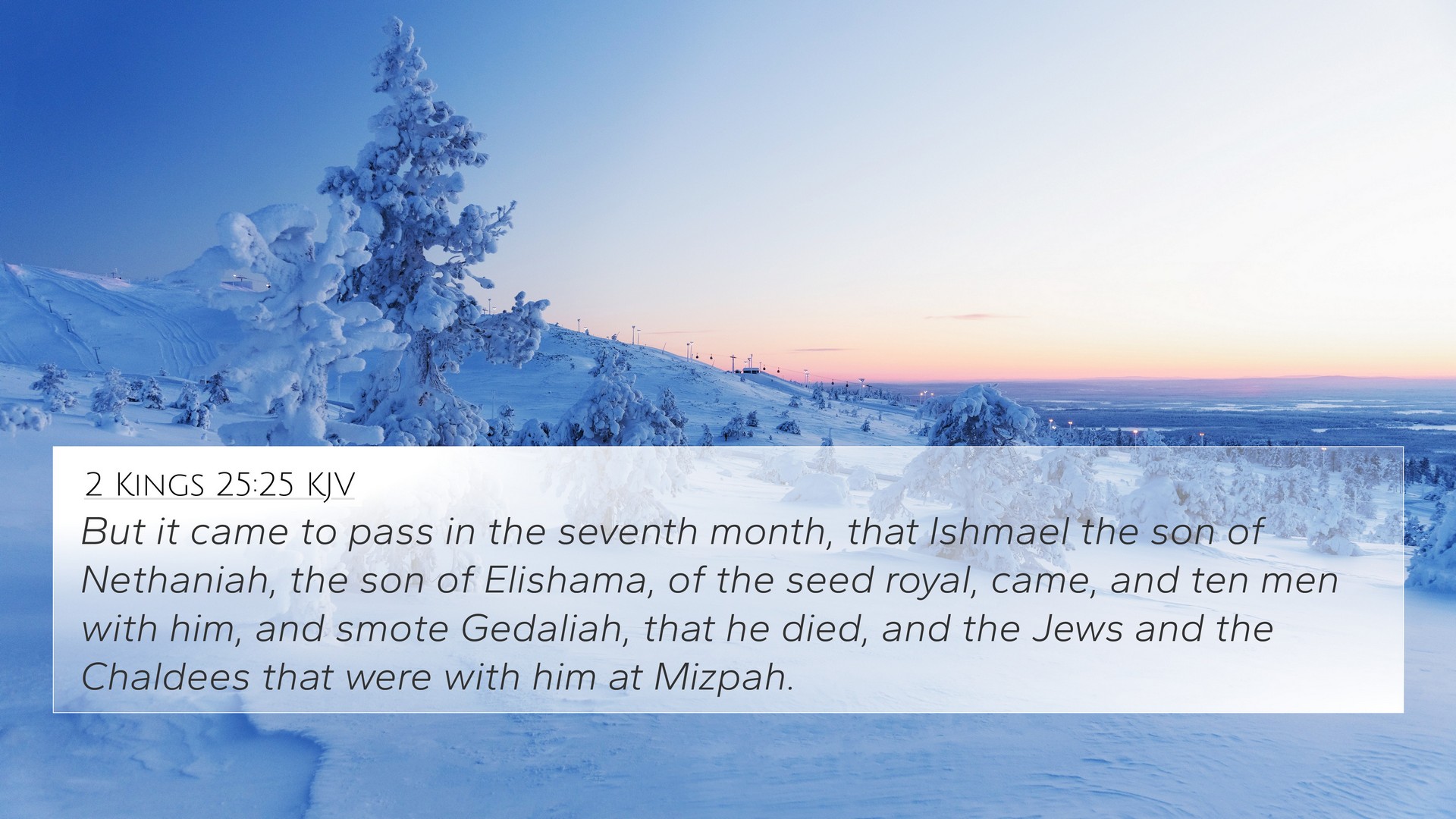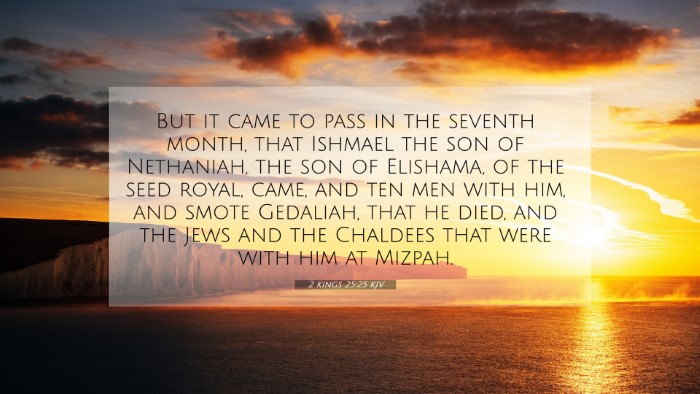Understanding 2 Kings 25:25
Bible Verse: 2 Kings 25:25 - "But it came to pass in the seventh month, that Ishmael the son of Nethaniah, the son of Elishama, of the seed royal, came, and ten men with him, and smote Gedaliah, that he died, and the Jews and the Chaldees that were with him at Mizpah."
Summary and Interpretation
The narrative in 2 Kings 25:25 marks a crucial moment in the history of Judah following the Babylonian conquest. This verse illustrates the ongoing political strife and the consequences of disobedience to God.
Commentary Insights
- Matthew Henry: Henry emphasizes the treachery of Ishmael, highlighting his royal lineage as a point of significance. His violent act against Gedaliah represents a failure of leadership and unity among the remnants of Judah. Henry notes that Gedaliah's assassination exacerbates the already tumultuous situation for the people left in Jerusalem.
- Albert Barnes: Barnes points out that Gedaliah was appointed governor by the Babylonians and his murder marked a significant political setback. Barnes connects this event to the broader theme of instability in Judah, which ultimately leads to further exile and suffering for the Jewish people.
- Adam Clarke: Clarke elaborates on the identity of Ishmael, suggesting that he acted out of a mix of personal ambition and discontentment with Babylonian rule. Clarke highlights the implications of Gedaliah's assassination, as it instigated a wave of fear and uncertainty among the people left in Judah.
Thematic Connections
This verse not only recounts a historical event but reveals deeper themes of treachery, consequences of leadership, and the persistence of sin amidst God’s judgment. It serves as a reminder of the cycle of sin and punishment that characterizes the history of Israel and Judah.
Cross-References
To further explore the significance of this event and its implications, we can investigate related biblical verses that provide deeper insights:
- Jeremiah 40:7-10: Highlights the aftermath of the Babylonian exile and Gedaliah's appointment.
- Jeremiah 41:1-3: Provides a more detailed account of the assassination of Gedaliah and the resulting chaos.
- 2 Kings 25:23: Discusses the loyalty of the army leaders to Gedaliah before his assassination.
- Isaiah 30:1-5: Warns against seeking human alliances over reliance on God, reflecting the mindset of Israel's leaders during this tumultuous times.
- 2 Chronicles 36:15-21: Discusses God’s judgment against Judah and how it led to the exile, providing context for the events in Kings.
- Jeremiah 38:14-28: Illustrates the prophetic messages during the time of siege and their relevance to the present verse.
- Ezekiel 33:1-9: Depicts the role of the prophet as a watchman, connecting themes of accountability to the leadership experienced in 2 Kings.
- Matthew 26:47-50: Though New Testament, offers insight about betrayal, paralleling Ishmael’s treachery against Gedaliah.
- Luke 9:62: Ties back to the theme of commitment in leadership, contrasting with the failure of Ishmael's loyalties.
- Romans 12:19: Encourages believers to leave vengeance to God, resonating with the long-term consequences of human violence illustrated in this incident.
The Importance of Cross-Referencing
Utilizing tools for Bible cross-referencing can enrich one’s study of Scripture, allowing for a more comprehensive understanding of themes and narratives.
The Bible concordance serves as a vital resource in identifying connections between verses. By engaging in cross-referencing Bible study, believers can explore the profound links embedded within the texts.
Using Cross-References Effectively
- Identify key themes and terms in your verse of interest.
- Utilize a Bible cross-reference guide for related verses.
- Look for parallels that reveal deeper theological principles.
- Consider historical context alongside scripture to gather a holistic understanding.
Building An Inter-Biblical Dialogue
This verse, along with its cross-references, allows for an inter-Biblical dialogue that reflects the continuity of God’s message throughout Scripture. By engaging with these verses, believers can identify the comparative Bible verse analysis that enriches their faith.
In summary, 2 Kings 25:25 provides a poignant illustration of the consequences of political power struggles amidst divine judgment. By studying this verse along with its connections, readers can grasp the overarching narrative of Scripture and cultivate a deeper understanding of God’s sovereignty and the responsibilities of leadership.






